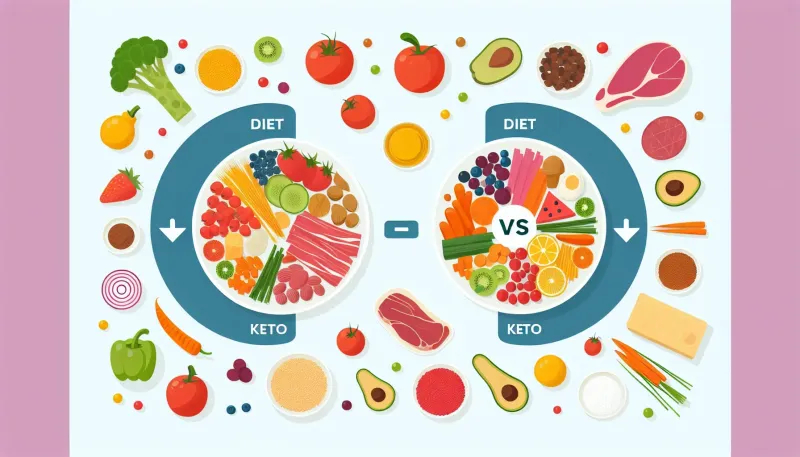Mediterranean Diet vs Keto: Which is Best for You?

Discover the key differences between the Mediterranean diet and the Keto diet, their health benefits, and which one might be best for you.
Choosing the right diet plan can be a challenging task, especially when it comes to popular options like the Mediterranean diet and the Keto diet. Both diets promote health and weight loss, but they do so in different ways. Understanding the pros and cons of each can help you decide which one suits your lifestyle and health needs best. In this article, we will delve into the intricacies of both diets, comparing their principles, benefits, and potential drawbacks.
Understanding the Mediterranean Diet
Key Principles of the Mediterranean Diet
The Mediterranean diet is inspired by the traditional eating habits of countries bordering the Mediterranean Sea, such as Greece, Italy, and Spain. Its key principles include:
- Plant-Based Foods: Emphasis on fruits, vegetables, whole grains, legumes, and nuts.
- Healthy Fats: High consumption of olive oil, a source of monounsaturated fats.
- Moderate Protein: Moderate consumption of fish, poultry, and eggs; red meat is limited.
- Dairy Products: Low to moderate amounts, mainly in the form of cheese and yogurt.
- Low Sugar Intake: Limited intake of sugary desserts and refined sugars.
- Wine in Moderation: Regular but moderate consumption of red wine, usually with meals.
Health Benefits of the Mediterranean Diet
The Mediterranean diet offers numerous health benefits, supported by extensive research:
- Heart Health: Reduces the risk of cardiovascular disease, thanks to its high intake of unsaturated fats and antioxidants.
- Weight Management: Associated with healthier body weight and reduced risk of obesity.
- Diabetes Control: Improves blood sugar levels and reduces the risk of Type 2 diabetes.
- Longevity: Linked to a lower risk of mortality and increased life expectancy.
Understanding the Keto Diet
Key Principles of the Keto Diet
The Ketogenic (Keto) diet is a high-fat, low-carbohydrate diet designed to shift the body's metabolism into ketosis, where fats are used as the primary energy source instead of carbohydrates. The key principles include:
- Very Low Carbs: Typically limits carbohydrate intake to around 20-50 grams per day.
- High Fat Intake: Around 70-80% of daily calories come from fat sources like oils, butter, avocados, and fatty fish.
- Moderate Protein: Approximately 20-25% of calories from protein sources such as meat, eggs, and dairy.
- Minimal Sugar: Strict avoidance of sugars and sweetened foods.
Health Benefits of the Keto Diet
The Keto diet has gained popularity for its potential health benefits, particularly in weight loss and metabolic health:
- Rapid Weight Loss: Can lead to significant and rapid weight loss due to the body's increased ability to burn fat.
- Improved Blood Sugar Control: Beneficial for individuals with Type 2 diabetes or insulin resistance.
- Enhanced Mental Clarity: Some individuals report better focus and mental clarity on the Keto diet.
- Reduced Inflammation: May help reduce inflammation, which is linked to numerous chronic diseases.
Comparing Mediterranean Diet vs Keto
Flexibility and Sustainability
One of the critical differences between the Mediterranean diet and the Keto diet is their approachability and sustainability. The Mediterranean diet is generally considered more flexible and easier to maintain over the long term, as it includes a wide variety of foods and does not require strict tracking of macronutrients. In contrast, the Keto diet requires careful monitoring of carbohydrate intake, which can be challenging for some people to sustain.
Impact on Heart Health
Both diets have demonstrated positive effects on heart health, but they achieve this differently. The Mediterranean diet enhances heart health through its high intake of monounsaturated fats, fiber, and antioxidants. These components help lower bad cholesterol (LDL) and increase good cholesterol (HDL), reducing the risk of cardiovascular diseases. The Keto diet can also improve lipid profiles by increasing HDL and reducing triglycerides, but its high-fat content requires careful selection of healthy fats to prevent potential adverse effects.
Weight Loss and Metabolism
The Keto diet is renowned for its rapid weight loss results, mainly due to the body's shift to ketosis, which burns fat more effectively. However, this rapid weight loss can be challenging to maintain long-term. The Mediterranean diet supports steady and sustainable weight loss through balanced eating habits and portion control, making it a viable option for long-term weight management.
Diabetes and Blood Sugar Control
Both diets can benefit individuals with diabetes, but in distinct ways. The Mediterranean diet helps manage blood sugar levels through its emphasis on whole grains, fiber-rich foods, and healthy fats. The Keto diet significantly lowers carbohydrate intake, which can lead to stable blood sugar levels and even reduced dependence on diabetes medications. However, the extreme carb restriction of Keto may not be suitable for everyone, particularly those with specific health conditions.
Choosing the Right Diet for You
Personal Lifestyle and Preferences
When deciding between the Mediterranean diet and the Keto diet, consider your personal lifestyle, preferences, and health goals. If you prefer a more varied and less restrictive diet, enjoy fruits, vegetables, and whole grains, and seek long-term health benefits, the Mediterranean diet may be the better choice for you. On the other hand, if rapid weight loss and improved metabolic health are your primary goals and you can commit to a strict low-carb regimen, the Keto diet might be more suitable.
Health Conditions and Medical Advice
Both diets have specific health benefits, but they are not one-size-fits-all solutions. Always consult with a healthcare professional or a registered dietitian before making significant changes to your diet, particularly if you have underlying health conditions. They can help tailor a diet plan that meets your nutritional needs and health goals.
Conclusion
In conclusion, the decision between the Mediterranean diet vs Keto ultimately depends on your individual health goals, lifestyle preferences, and medical needs. Both diets have unique advantages and potential drawbacks. The Mediterranean diet offers a flexible, heart-healthy approach that supports long-term health and wellness, while the Keto diet provides rapid weight loss and improved metabolic health through strict low-carb eating. By understanding these differences and consulting with a healthcare professional, you can make an informed decision that best supports your path to a healthier lifestyle.



























